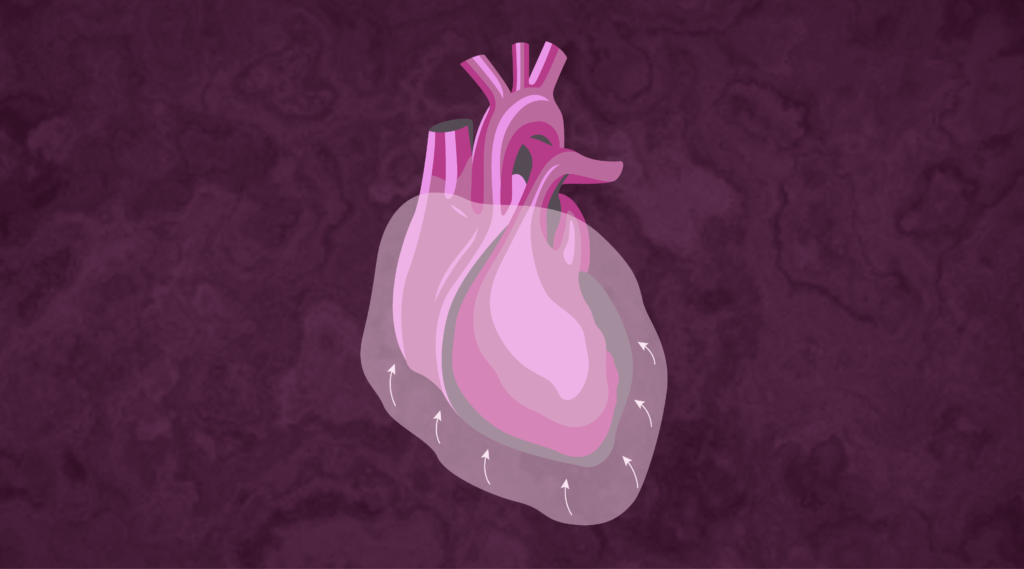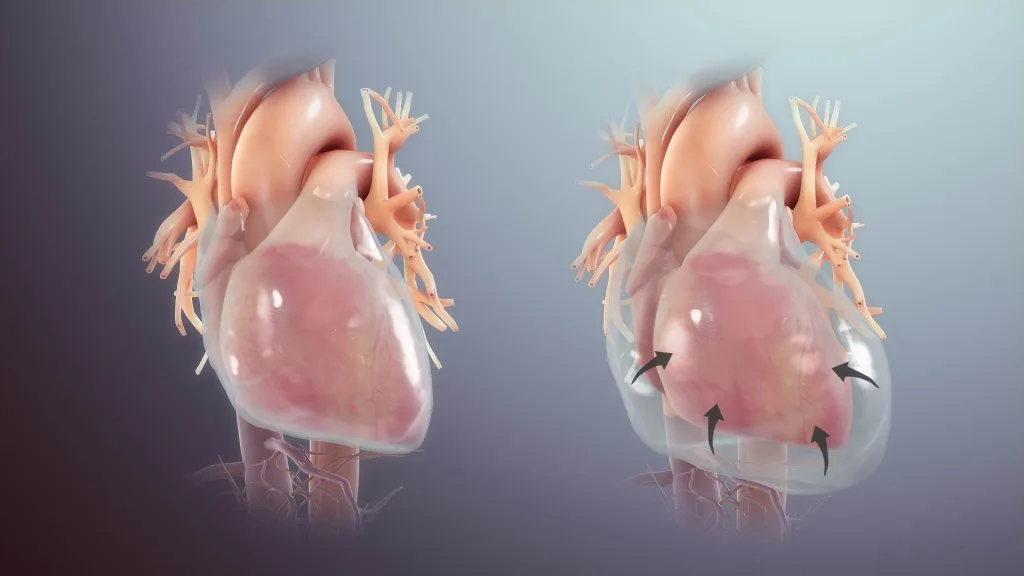Heart health is something that we should all be paying attention to. Unfortunately, many of us don’t realize that fluid around the heart can put us at risk. In medical terms, this is called pericardial effusion and it can have serious consequences if left untreated.
So what is pericardial effusion? This occurs when a fluid builds up in the sac around the heart (pericardium). The excess fluid can put pressure on the heart and disrupt its normal functioning, leading to a variety of symptoms that range from mild to severe. These include chest pain, difficulty breathing, rapid heartbeat, fatigue, and even arrhythmias. If left untreated for too long, pericardial effusion can even lead to heart failure or death.
The cause of pericardial effusion varies from person to person but often has something to do with inflammation of the pericardium or an infection in the area surrounding the heart. It may also be caused by diseases such as cancer or autoimmune disorders like lupus or rheumatoid arthritis. Certain medications and radiation therapy may also contribute to this condition.
If there is only a small amount of extra fluid in the pericardium, you may not need treatment and it will go away on its own. However, if there is a larger amount of fluid present or if it has been going on for a while, then treatment will be necessary. This typically involves draining off some of the excess fluid using a procedure known as pericardiocentesis which uses a needle and small catheter to remove it. Sometimes medications are also prescribed to reduce inflammation or treat underlying conditions that might be causing the fluid buildup in your body.
The good news is that when treated properly and promptly by your doctor, most people make a full recovery from this condition without any lasting damage to their hearts or other organs in their bodies. So if you are experiencing any symptoms that could indicate you have excess fluid around your heart (such as chest pain or difficulty breathing) then please consult your doctor riht away for proper diagnosis and treatment options!
The Fatal Effects of Fluid Around the Heart
A pericardial effusion, or fluid around the heart, can be fatal under certain circumstances. In some cases, the fluid puts pressure on the heart, causing it to pump less efficiently and leading to a decrease in blood flow. This can cause a person to experience symptoms such as an irregular heartbeat, chest pain, shortness of breath, or even fainting. If left untreated, this condition can worsen over time and lead to congestive heart failure or death. However, if diagnosed early and treated appropriately with medications and/or surgery, it is possible to reduce the risk of fatal complications.

Treating Fluid Around the Heart
The cure for fluid around the heart (pericardial effusion) depends on the cuse of the condition. If it is caused by infection, antibiotics may be prescribed. If caused by cancer, chemotherapy or radiation may be recommended. In some cases, surgical removal of the excess fluid may be necessary. Pericardiocentesis is a procedure done to remove fluid that has built up in the sac around the heart (pericardium). It’s done using a needle and small catheter to drain excess fluid. Additionally, lifestyle modifications such as reducing salt intake, losing weight if needed, and avoiding activities that cause extra stress on your heart can help reduce fluid accumulation and help prevent future episodes.
Signs and Symptoms of Fluid Around the Heart and Heart Failure
No, fluid around the heart does not necessarily mean heart failure. Fluid around the heart can be caused by a condition known as pericardial effusion or pericarditis. This is when fluid accumulates in the space between the layers of tissue that cover the heart, called the pericardium. This fluid accumulation can cause chest pain, shortness of breath, and other symptoms. However, it is not necessarily indicative of congestive heart failure, which is a condition where there is an imbalance in how efficiently the heart pumps blood throughout the body. In congestive heart failure, fluid builds up in the lungs, making it difficult to breathe. This type of fluid accumulation neds to be managed with medications and lifestyle changes to prevent further damage to the heart muscle and keep it functioning properly.
Can Fluid Around the Heart Resolve Without Treatment?
Yes, in some cases, fluid around the heart can go away on its own. This typically occurs when the excess fluid is caused by a mild condition, such as a viral infection or inflammation. Depending on the severity of the condition, the body may be able to absorb and reabsorb the excess fluid naturally over time. However, if there is a large amount of extra fluid in your pericardium or if it is caused by a more serious medical condition, then medical treatment may be needed to reduce and eliminate the excess fluid. In thse cases, treatments such as medications or pericardiocentesis (a procedure that removes excessive fluid from the pericardium) may be necessary to reduce and eliminate the extra fluid.
The Length of Time Fluid Can Remain Around the Heart
The length of time you can have fluid around your heart depends on the type and severity of the condition. In acute cases, fluid can accumulate in as little as a week, while chronic cases may last for more than three months. Diagnosis and treatment from a medical professional is necessary to determine the cause of the fluid accumulation and to provide appropriate medical care.

The Causes of Fluid Build Up Around the Heart
Pericardial effusion is a condition in which fluid accumulates between the two layers of the pericardium, the membrane that surrounds the heart. Fluid build-up can be caused by a variety of factors, including infections, inflammation, trauma to the chest or heart, cerain drugs or toxins, kidney disease, autoimmune diseases such as lupus and rheumatoid arthritis, and radiation therapy. Certain types of cancer can also cause fluid build-up around the heart. In some cases, the exact cause of pericardial effusion is unknown. If left untreated, this condition can lead to an accumulation of fluid that puts pressure on the heart and interferes with its ability to pump blood effectively. Treatment typically involves draining the fluid through a procedure called pericardiocentesis and then treating any underlying medical condition that may have caused it.
Symptoms of Fluid Around the Heart
Fluid around the heart, also known as pericardial effusion, can cause a variety of symptoms. People may feel a feeling of “fullness” in their chest, discomfort when they lie down, shortness of breath (dyspnea), and difficulty breathing. In some cases, there may be no symptoms at all. If the condition is severe or if the fluid accumulates quickly, it could lead to decreased cardiac output, chest pain, and even sudden death. It is important to seek medical care if you are experiencing any of these symptoms.
Diagnosing Fluid Around the Heart
A fluid build-up around the heart can be diagnosed through an echocardiogram. During this test, sound waves are used to create images of the chambers and valves of the heart. The echocardiogram can show how well the heart is pumping and if there is an abnormal amount of fluid between the two layers of the pericardium, which indicates a fluid build-up. An echocardiogram can also detect a decrease in heart function due to pressure on the heart (tamponade). To further diagnose any issues, doctors may order additional imaging tests such as a CT scan or MRI.
Conclusion
In conclusion, the heart is an incredible organ that is vital to our survival. It pumps blood around the body, delivering oxygen and nutrients to our cells and organs. Unfortunately, it can sometimes become overwhelmed by diseases, such as pericardial effusion or congestive heart failure. If left untreated, these conditions can lead to serious health complications or even death. That’s why it’s important to take steps to prevent heart disease and seek medical treatment if any symptoms appear. With early detection and proper treatment, many heart-related issues can be managed successfully.
